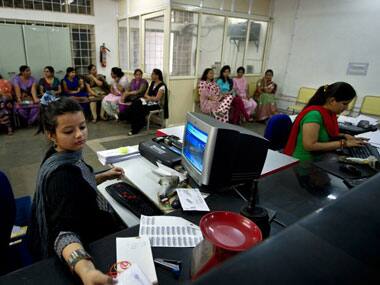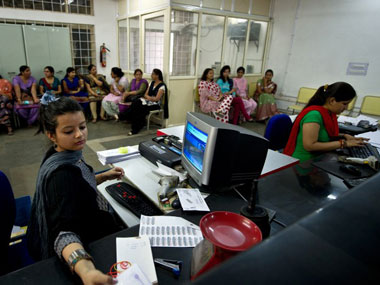New Delhi: Two years after the horrific Delhi gang-rape case, the national capital is still clueless about measures to curb, if not completely stop, sexual harassment of women in public spaces. It is clear by now that harsh laws don’t work without the support of efficient enforcement. Widespread public outrage carried to every home through the media does not work either. Legislating harsh laws has proved to be an easy escape route for the ruling class – this includes politicians of all hues. Scarcity in policing and quick judicial remedy is where a major part of the problem lies, and this is an area where there’s no public pressure on them to deliver. [caption id=“attachment_1854121” align=“alignleft” width=“380”] Women’s safety continues to be an unsolved issue in Delhi. Agencies[/caption] Firstpost sought to know from the political parties what exactly they planned to do in three areas where women in particular and the public in general are most vulnerable: public transport; public places, including roads, markets and parks; and the journey back home in the night. All the parties admitted that Delhi continued to be unsafe for women despite all the noise over the 16 December, 2012 gangrape case and claimed they had women’s safety on the top of their agenda. “Women security is our top priority. Our plan is to have a centralized monitoring system in Delhi. A new mobile App for women would be launched that will connect with the centralized system. And this system will function 24x7, round the year,” Delhi BJP spokesperson Harish Khurana told Firstpost. The BJP plans to cover the entire City with CCTV cameras and also install the same in all DTC buses. In addition, proper verification of cabs in operation and proper illumination of streets and public places are immediately required. “There’s an urgent need to increase the number of PCR vans, have more women cops, and more police pickets in every nook and corner of Delhi. The Delhi BJP has written to the Ministry of Home Affairs regarding this,” added Khurana. Immediately after the rape of an executive by an Uber cabbie, the Congress had slammed the NDA government for the rise in rape cases in Delhi. “The situation has deteriorated in the last six months. On the floor of Parliament, I said there has been 15.7 percent rise in rape cases in Delhi. What happened to Narendra Modi’s election slogan – Bahut hua naari par vaar, abki baar Modi sarkar? Even, the Nirbhaya fund meant for women safety has remained unspent,” said All India Congress Committee spokesperson Shakeel Ahmed. The Congress’s prescription to the problem appears vague though. It includes, first, a need for a concerted effort to bring a change in the mindset of men and society towards women travelling alone in public transport or moving in public places; second, strict enforcement of law by the agencies concerned, so that women can feel safe while commuting alone even during late hours. It did not have anything concrete to offer in the three areas under question. The Aam Aadmi Party’s plan of action appears better thought out though. Through its initiative ‘Delhi Dialogue’ on women’s safety, the party has listed a number of measures like appointing marshals in buses, policy to deal with sexual harassment of women in the unorganized sector, installation of CCTV cameras across Delhi for monitoring safety measures, street lights and lighting up public places, ensuring safety through last point connectivity for women who commute late hours, and safe transport facility outside Metro stations during late hours. “The Uber cab incident exposed that we haven’t moved an inch since the December 16 gang rape. Nothing has changed in two years. After the recent rape incident, Home Minister said it shouldn’t be politicized. Why? Everything that seriously affects citizens, should be taken on a political platform,” remarked AAP member Anupam Singh. The social organizations and common citizens feel the need for a stronger sensitization on the issue of women safety. “Delhi continues to be terribly unsafe. The issue of women’s safety can’t be tackled by just isolating the problem of rape. Both the government and the local administration should send a clear message that women ought to be respected in public places, as it is their right to be there at any hour of the day,” secretary, All India Progressive Women’s Association (AIPWA), Kavita Krishnan said. “The permanent staff members of DTC should be made accountable for their jobs, whereas the administration should ensure strict regulation and verification for taxi services unlike the case of Uber. Women’s safety must be ensured as women have every right to be safe in public places as men,” added Krishnan. “The government also has to be more sensitive towards this issue. After the December 16 gang rape case, Sushma Swaraj and Smriti Irani, both cabinet ministers now, were on street with placards in their hands stating – Naari ka yeh apmaan, nahi sahega Hindustan (India won’t tolerate this insult of a woman). I was so impressed by their gesture. But unfortunately after this Uber incident, none of the two ministers uttered a single word, which is painful,” lamented Shruti Sharma, a Delhi-based Orthopedic.
Women’s safety continues to be an unsolved issue in Delhi. Agencies[/caption] Firstpost sought to know from the political parties what exactly they planned to do in three areas where women in particular and the public in general are most vulnerable: public transport; public places, including roads, markets and parks; and the journey back home in the night. All the parties admitted that Delhi continued to be unsafe for women despite all the noise over the 16 December, 2012 gangrape case and claimed they had women’s safety on the top of their agenda. “Women security is our top priority. Our plan is to have a centralized monitoring system in Delhi. A new mobile App for women would be launched that will connect with the centralized system. And this system will function 24x7, round the year,” Delhi BJP spokesperson Harish Khurana told Firstpost. The BJP plans to cover the entire City with CCTV cameras and also install the same in all DTC buses. In addition, proper verification of cabs in operation and proper illumination of streets and public places are immediately required. “There’s an urgent need to increase the number of PCR vans, have more women cops, and more police pickets in every nook and corner of Delhi. The Delhi BJP has written to the Ministry of Home Affairs regarding this,” added Khurana. Immediately after the rape of an executive by an Uber cabbie, the Congress had slammed the NDA government for the rise in rape cases in Delhi. “The situation has deteriorated in the last six months. On the floor of Parliament, I said there has been 15.7 percent rise in rape cases in Delhi. What happened to Narendra Modi’s election slogan – Bahut hua naari par vaar, abki baar Modi sarkar? Even, the Nirbhaya fund meant for women safety has remained unspent,” said All India Congress Committee spokesperson Shakeel Ahmed. The Congress’s prescription to the problem appears vague though. It includes, first, a need for a concerted effort to bring a change in the mindset of men and society towards women travelling alone in public transport or moving in public places; second, strict enforcement of law by the agencies concerned, so that women can feel safe while commuting alone even during late hours. It did not have anything concrete to offer in the three areas under question. The Aam Aadmi Party’s plan of action appears better thought out though. Through its initiative ‘Delhi Dialogue’ on women’s safety, the party has listed a number of measures like appointing marshals in buses, policy to deal with sexual harassment of women in the unorganized sector, installation of CCTV cameras across Delhi for monitoring safety measures, street lights and lighting up public places, ensuring safety through last point connectivity for women who commute late hours, and safe transport facility outside Metro stations during late hours. “The Uber cab incident exposed that we haven’t moved an inch since the December 16 gang rape. Nothing has changed in two years. After the recent rape incident, Home Minister said it shouldn’t be politicized. Why? Everything that seriously affects citizens, should be taken on a political platform,” remarked AAP member Anupam Singh. The social organizations and common citizens feel the need for a stronger sensitization on the issue of women safety. “Delhi continues to be terribly unsafe. The issue of women’s safety can’t be tackled by just isolating the problem of rape. Both the government and the local administration should send a clear message that women ought to be respected in public places, as it is their right to be there at any hour of the day,” secretary, All India Progressive Women’s Association (AIPWA), Kavita Krishnan said. “The permanent staff members of DTC should be made accountable for their jobs, whereas the administration should ensure strict regulation and verification for taxi services unlike the case of Uber. Women’s safety must be ensured as women have every right to be safe in public places as men,” added Krishnan. “The government also has to be more sensitive towards this issue. After the December 16 gang rape case, Sushma Swaraj and Smriti Irani, both cabinet ministers now, were on street with placards in their hands stating – Naari ka yeh apmaan, nahi sahega Hindustan (India won’t tolerate this insult of a woman). I was so impressed by their gesture. But unfortunately after this Uber incident, none of the two ministers uttered a single word, which is painful,” lamented Shruti Sharma, a Delhi-based Orthopedic.
Women's safety: Dear politicians, platitude won’t work, show us concrete steps
Debobrat Ghose
• December 17, 2014, 14:27:26 IST
Two years after the Delhi gang-rape case, the national capital is still clueless about measures to curb, if not completely stop, sexual harassment of women.
Advertisement
)
End of Article